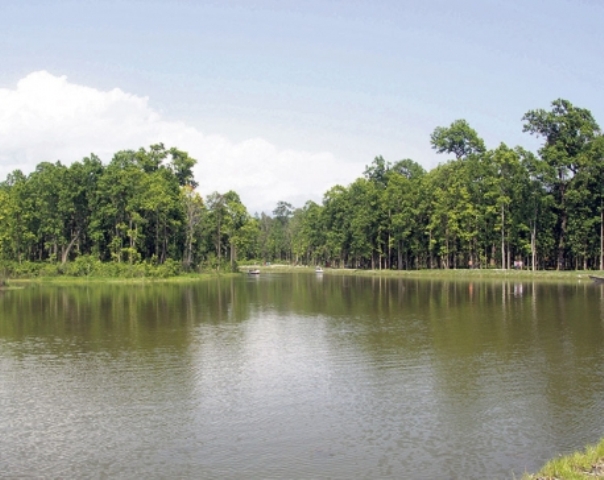Hoping for an incline in tiger population
5 years ago

5 years ago

6 years ago

6 years ago

Ecotourism is the form of tourism that involves the nature-based traveling in undisturbed and untouched remote places. The main focus of ecotourism is in those areas which are rich in natural beauty, biodiversity, and cultural heritage. Due to the presence of massive mountains, rolling hills, abundant vegetation, diverse wildlife, and culture; Nepal is a popular tourist destination and ideal location for ecotourism. Ecotourism is the main form of tourism in the country aside from the attraction in Kathmandu Valley and other historical cities.
Nepal is a playground for tourists with different activities like mountain climbing, trekking, visiting religious and cultural sites, rafting, bungee- jumping, rock climbing, mountain biking, jungle safaris, paragliding, visiting museums, experiencing indigenous products, meditation etc. These activities are more or less related to ecotourism in the form of nature, wildlife, adventure and culture-based tourism. So, in a developing country like our’ s ecotourism can be used to achieve sustainable economic development. There are different forms of ecotourism developed worldwide as community-based ecotourism, ecosystem ecotourism, cultural ecotourism, nature-based ecotourism, protected area ecotourism, and rural ecotourism.
The commencement of ecotourism in Nepal cannot be dictated so clearly. But the successful Annapurna I ascent by Maurice Herzog in 1950 has led the informal beginning of ecotourism in Nepal. The importance and necessity of ecotourism were realized significantly with the enactment of the National Park and Wildlife Conservation Act in 1973 and establishment of various natural protected areas in the hope of conservation of ecosystem and development in the community and other sectors in an integrated way.
The trend of tourism growth in Nepal spectacularly tourism growth in Nepal is gradually heading towards mass tourism. Hence, it is the right time to implement the principles of ecotourism so that it can help conserve natural ecosystems and promote local culture while protecting generations-old cultural and religious heritage by curbing the fast growth of tourism. Ecotourism provides maximum involvement of all the stakeholders of the tourism industry to aware the need for ecotourism as responsible tourism to promote the balanced development in the country. It gives priority to ecological resource integrity, environmental conservation, community development by maintaining low impact and non -consumptive uses of local resources.
It focuses on achieving three concurrent goals of biodiversity conservation, poverty reduction and business viability using sustainable principles and practices. It emphasizes the protection of natural resources, biological diversity and sustainability of the resource. It increases the mobility of people, social stability and harmony; strengthen traditional cultural, hospitality and folkway and decreases political conflict. Economic benefits of ecotourism include direct employment in hotels, lodges, tourist restaurants and tourist chauffeuring. It is an integral part of the master development strategy of a developing nation. In Nepal ecotourism helps to enhance forest cover, flora, fauna, greenery, alternative energy sources, natural resource, biodiversity and other environmental benefits. It helps in controlling religious and antisocial activities, conserving religious and cultural heritage, maintaining peace and prosperity and increase cooperation among people with religious belief and tolerance. It has a great role in poverty reduction, rural development, agricultural transformation, community enrichment and social empowerment of women in Nepal.
Besides various benefits of ecotourism, there has been adverse effects such as unwanted pressure on natural resources, environmental pollution, loss of natural habitats and deterioration of natural vegetation, depletion of natural resources, cultural erosion and increase criminal activities. So, the planning of ecotourism needed to be developed while embracing the twin goal of local development and environmental conservation. In this process, ecotourism could be a tool to curb and control the adverse effects of mass tourism.
The tourism industry also has eventually adopted the principles of ecotourism as its key issues in developing responsible and advantageous tourism in the country. In this early stage of ecotourism, it is difficult to have sufficient private agencies and local people delivering food, lodging, tour management, and tourism activities during peak visiting season. There is a need for proper training on nature guiding, baking, cooking, housekeeping, sustainable use of tourism resources, proper handling of tourism demands, expertise in park management and finance management. The tourism resources need to be utilized properly and then ecotourism can be the best vehicle to deliver socio-economic enhancement of remote & rural areas and also to safeguard the environment of the host community. If these could be practiced positively and efficiently, then the entire tourism industry would flourish to its apex leading to the sustainable development of the country.

- by RAKHI BIND

- by Republica

- by Bishakha Koirala

- by Divya Adhikari
Leave A Comment